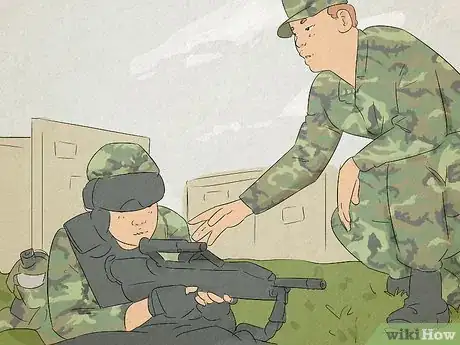This article was co-authored by wikiHow Staff. Our trained team of editors and researchers validate articles for accuracy and comprehensiveness. wikiHow's Content Management Team carefully monitors the work from our editorial staff to ensure that each article is backed by trusted research and meets our high quality standards.
There are 11 references cited in this article, which can be found at the bottom of the page.
This article has been viewed 8,926 times.
Learn more...
The US Army’s Criminal Investigation Command (CID) takes care of a vast array of forensic and criminal investigations, mainly those in which the Army has an interest. The entire application process usually takes 120 days from start to finish, and there are a lot of requirements you have to meet before being accepted into the CID training program. However, if you stick with it, you’ll find that being a part of CID is a valuable way to serve your country and grow as an individual.[1]
Steps
Experience and Education
-
1Serve a minimum of 2 years in the military, but not more than 10. If you’re currently serving overseas, finish at least 2/3 of your tour before applying. If you’re presently deployed, wait until you’re back from deployment and have your stabilization code removed before applying.[2] You can also apply if you’re a Reserve or National Guard member, but you’ll have to apply through a CID Reserve unit.[3]
- At times, CID offers an Officer to CID Warrant Officer Program. As of November 2020, that program is not accepting new applicants.[4]
-
2Enter as a civilian if you have 3 years of felony investigative experience. Or, you could also have a Masters Degree in a relevant field, like law or criminal justice. After acceptance into the program, you’ll have to complete US Army Basic Combat Training, 31B Military Police One Station Unit Training, and the CID Special Agent Course. Find more info here: https://www.cid.army.mil/assets/docs/Direct-Accession-Take-1_2018.pdf.[5]
- If you’re a civilian, you must be appointed before your 37th birthday. If you’re older, you won’t qualify for the program.
Advertisement -
3Complete at least 60 hours of college from an accredited institution. If you haven’t done this yet, get enrolled so you can start accumulating those credits! There are no waivers for individuals who haven’t gotten their credit hours in.[6]
- A Bachelors Degree in one of these fields could help your CID career: criminal justice, forensic science, forensics, accounting, psychology, and biology.[7]
-
4
-
5Take the Basic Leader Course (BLC) as part of obtaining an SGT grade.[12] The BLC is a required month-long course focused on teaching you the skills you need to be a leader. To work in CID, you have to move up in the ranks to SGT (sergeant), and this BLC course is a necessary part of that.[13]
- This course focuses on things like leading, war fighting, land navigation, and other essential skills. You’ll receive a combination of classroom and field instruction.
- You'll take this course at a Non-commissioned Officer Academy (NCO) and stay at the academy for the duration of the class.
Requirements and Standards
-
1Be a US citizen who is at least 21 years old. If you’re a civilian, you cannot be over the age of 37 to join CID. Regardless of whether you’re in the military or a civilian, you’ll have to be able to prove citizenship when you submit your application.[14]
- Once you start your application, you have 30 days to submit any necessary documentation.[15]
-
2Stay in shape so you can pass the Army Physical Fitness Test. In addition to being physically fit, you also have to meet the height and weight requirements.[16]
- Find out more about the height and weight requirements at https://ssilrc.army.mil/wp-content/uploads/2019/10/AR-600-9-The-Army-Body-Composition-Program-16-July-2019.pdf.
-
3Start building or repairing your credit score. This is a little vague, but CID is looking for individuals with good credit.[17] If you have credit issues when you apply, they’ll be reviewed on an individual case basis, but there’s no guarantee you’ll get a waiver to move on in the application process.[18]
- If you’ve claimed bankruptcy in the last 3 years, that automatically disqualifies you from CID. If that’s a situation you’re dealing with, plan on waiting until you’re 3 years past that incident before you apply.
-
4Maintain the ability to deploy worldwide. This can be a big ask, so make sure you’re able to commit to this before beginning the application process. If you’re in a committed relationship or have children, talk to your family beforehand to make sure everyone’s on board with you potentially being away from home for long stretches.[19]
- There isn’t a set amount of time you’ll be traveling, but it could be a routine part of your job.
-
5Get a valid driver's license and maintain a clean driving record. Take whatever steps you need to get or renew your driver's license if necessary. If you have any major incidents on your driving record, like at-fault accidents or an excessive number of speeding tickets, consider waiting until they’re a few years past before applying, as they can negatively affect your chances of getting accepted into CID.[20]
- Generally, a favorable driving record is one that is accident and ticket-free for at least 3 years.
-
6Focus on demonstrating a high level of integrity and strong moral values. CID is looking for individuals who have the right mindset and character. Because you’ll be working on criminal investigations, it’s super important that you have a good reputation and a solid ethical code.[21]
- To find out more and see the full list of requirements to join CID, visit https://www.cid.army.mil/militaryagents2.html.
Application Process
-
1Find the right application based on your service level. If you’re in the military, you can access the link to the application portal at CID’s website. You must have a Common Access Card enabled device.[22] If you’re in the reserves, apply through a CID reserve unit. If you’re a civilian, apply for the job through https://www.usajobs.gov.[23]
- If you need help, you can always talk to an Army Recruiter to get more information.
-
2Fill out the application and upload necessary documents within 30 days. Answer questions about your qualifications, education, and experience, as well as basic questions about citizenship, age, and criminal history. You may need to submit a resume, proof of citizenship, proof of credit hours, marriage certificates, or any other requested documents.[24]
- The CID website states that the length of the application process is, in large part, determined by how motivated you are to get everything finished. So, buckle down and get your application completed so you can move forward as soon as possible.[25]
-
3Pass a Single Scope Background Investigation (SSBI).[26] If your initial application makes it through, they'll notify you, and the next part of the process will begin. The background investigation takes a while, as CID talks to your coworkers, employers, family, and friends. They verify your citizenship, check into your background for the past 10 years or back to age 18, and evaluate all the intel they gathered.[27]
- CID is looking for people who have strong moral character and high integrity. They’ll look into your reputation and also check out your mental and emotional health history.[28]
-
4Complete a panel interview, medical screening, and security screening. These will only take place once your background checks have cleared. Your local CID Detachment Recruiting Coordinator will contact you to schedule these interviews and screenings. They may take place on the same day but are generally scheduled separately to make sure you pass each phase before moving on to the next.[29]
- There unfortunately aren’t a lot of details available about what each of these processes entails. Ask your recruiting coordinator or someone in CID if you want to know more.
- As of 2018, CID receives about 450 applications a year. Each one takes quite a long time to process, so don’t be surprised if it takes a while for each part to get scheduled.
-
5Wait for CID to either approve or reject your application. Once you finish all the parts of the application process, the entire thing goes through a quality review and panel review. This process involves a lot of people, and rejections are sent on to the Deputy Commanding General for a final say. If you’re approved, you’re in CID! You still have some training to get through before heading out into the field on your own, but you’ve passed the lengthy application process.[30]
- Keep in mind that CID is looking for the absolute best candidates. That’s why their vetting process is so thorough.
Training
-
1Complete a 16-week resident course to train you in special CID duties. This training takes place at US Army Military Police School located at Fort Leonard Wood in Missouri. You’ll learn everything from crime-scene processing to interviewing techniques and interrogation practices.[31]
- If you get into CID, you’ll be working with some of the top professionals in your field. It’s a fantastic opportunity!
-
2Spend your first year working as an apprentice agent.[32] This is a built-in part of the training process, so you don’t have to worry about procuring the internship for yourself. During this year, you’ll work with senior field agents and participate in a mentorship. It’s a great time to hone your skills and learn from the best.[33]
- While you learn a lot from classes and special training, there are some things you can’t know until you get out into the field. This year as an apprentice agent is an essential part of your process in CID.
-
3Continue ongoing professional training to hone your skills further. Once you’re in CID, your professional development never ends. You’ll undergo training for all kinds of things, like child abuse prevention, hostage negotiations, advanced crime scene investigation techniques, and more.[34]
- You can even obtain special training in an advanced field. You could spend time at the FBI academy or even pursue a Masters Degree in Forensic Science through George Mason University.
References
- ↑ https://www.cid.army.mil/assets/docs/CIDBrochure.pdf
- ↑ https://www.cid.army.mil/militaryagents2.html
- ↑ https://www.cid.army.mil/faq.html#sec2
- ↑ https://www.cid.army.mil/militaryagents2.html
- ↑ https://www.cid.army.mil/civilian-agents.html
- ↑ https://www.cid.army.mil/faq.html#sec2
- ↑ https://www.cid.army.mil/assets/docs/Direct-Accession-Take-1_2018.pdf
- ↑ https://www.cid.army.mil/militaryagents2.html
- ↑ https://www.cid.army.mil/faq.html#sec2
- ↑ https://www.armytimes.com/news/your-army/2014/11/19/boost-your-gt-score-save-your-career/
- ↑ https://www.armytimes.com/news/your-army/2014/11/19/boost-your-gt-score-save-your-career/
- ↑ https://www.cid.army.mil/assets/docs/CIDBrochure.pdf
- ↑ https://www.goarmy.com/soldier-life/being-a-soldier/ongoing-training/leadership-training/warrior-leader-course.html
- ↑ https://www.cid.army.mil/assets/docs/CIDBrochure.pdf
- ↑ https://www.army.mil/article/199369/change_to_cid_agent_application_criteria
- ↑ https://www.thebalancecareers.com/becoming-a-cid-agent-3344576
- ↑ https://www.cid.army.mil/militaryagents2.html
- ↑ https://www.cid.army.mil/faq.html#sec2
- ↑ https://www.cid.army.mil/assets/docs/CIDBrochure.pdf
- ↑ https://www.cid.army.mil/assets/docs/CIDBrochure.pdf
- ↑ https://www.cid.army.mil/assets/docs/CIDBrochure.pdf
- ↑ https://www.cid.army.mil/militaryagents2.html
- ↑ https://www.army.mil/article/199369/change_to_cid_agent_application_criteria
- ↑ https://www.army.mil/article/199369/change_to_cid_agent_application_criteria
- ↑ https://www.cid.army.mil/faq.html#sec2
- ↑ https://www.cid.army.mil/militaryagents2.html
- ↑ http://acqnotes.com/acqnote/careerfields/single-scope-background-investigation
- ↑ https://www.cid.army.mil/militaryagents2.html
- ↑ https://www.army.mil/article/199369/change_to_cid_agent_application_criteria
- ↑ https://www.army.mil/article/199369/change_to_cid_agent_application_criteria
- ↑ https://www.cid.army.mil/agent-training.html
- ↑ https://www.cid.army.mil/assets/docs/CIDBrochure.pdf
- ↑ https://www.cid.army.mil/agent-training.html
- ↑ https://www.cid.army.mil/agent-training.html
- ↑ https://www.cid.army.mil/militaryagents2.html
- ↑ https://www.cid.army.mil/faq.html#sec2










































































